

Mssackstein. Analyzing Visual Texts (share) - Google Slides. AP Lang Annotations.MOV. YouTube. AP: Rhetorical Analysis Portfolio - Christy's Classroom. Christy's Classroom Rhetorical Analysis Portfolio How Does this Page Work?
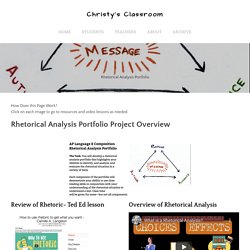
Click on each image to go to resources and video lessons as needed. Rhetorical Analysis Portfolio Project Overview Rhetorical Essay General Writing Resources (Helpful for all parts of the project) Possible Essay Outlines Sample Exams and Model Essays. Syllabus & Units - AP Language & Composition. How Trigger Warnings Are Hurting Mental Health on Campus. Something strange is happening at America’s colleges and universities.

A movement is arising, undirected and driven largely by students, to scrub campuses clean of words, ideas, and subjects that might cause discomfort or give offense. Last December, Jeannie Suk wrote in an online article for The New Yorker about law students asking her fellow professors at Harvard not to teach rape law—or, in one case, even use the word violate (as in “that violates the law”) lest it cause students distress. In February, Laura Kipnis, a professor at Northwestern University, wrote an essay in The Chronicle of Higher Education describing a new campus politics of sexual paranoia—and was then subjected to a long investigation after students who were offended by the article and by a tweet she’d sent filed Title IX complaints against her.
In June, a professor protecting himself with a pseudonym wrote an essay for Vox describing how gingerly he now has to teach. My Effing First Amendment. Ms. Fougerousse's Class - Home. How to make your arguments stronger (hint: longer is not the answer) – ideas.ted.com. Monica Garwood This post is part of TED’s “How to Be a Better Human” series, each of which contains a piece of helpful advice from someone in the TED community; browse through all the posts here.
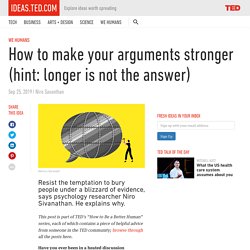
Have you ever been in a heated discussion (Breaking Bad vs. The Wire; spring vs. fall; small college vs. large university; carbon offsets vs. renewable energy credits) and wanted so badly to show the other person just how wrong they were? If you’re like most of us, you tried to overwhelm your opponent with sheer quantity, to barrage them with every scrap of evidence you could think up. As it turns out, piling on the proof is an unwise approach, says Niro Sivanathan, a psychology researcher and associate professor of organizational behavior at London Business School in a TEDxLondonBusinessSchool talk. For humans, receiving too much information interferes with our ability to process it. VISUAL RHETORIC & ANALYSIS - Photographs. Schedule - Rhetorics of Style. Spring 2019: January 22nd to May 10th Week 1 Wednesday, January 23rd Week 2 Monday, January 28th Wednesday, January 30th Week 3.
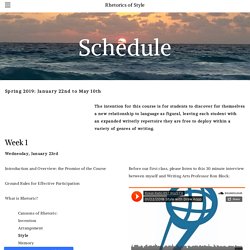
A Brief Guide to Keeping a Commonplace Book – Notebook of Ghosts. I had the opportunity to write for Dirge Magazine while it was still online (Rest in Peace).
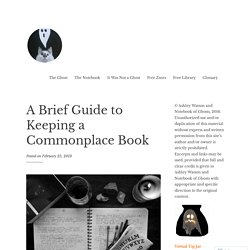
I learned so much as a writer from the editors, so I wanted to make sure I was able to save my favorite and proudest piece. I grabbed the following article from the depths of Wayback Machine. The article was published in Dirge Magazine with the original title “Before Bullet Journals, There Were Commonplace Books” on January 8, 2017. I hope you enjoy it as much as I enjoyed writing it! AP: Rhetorical Analysis Portfolio - Christy's Classroom. UPDATED! How to Teach the Rhetorical Analysis Paper - AP Language and Composition. Step Two: Finding the "Command" and the "Conquer"I have students identify the standard elements in a prompt: exigence, speaker/author, audience, title of works (if there is one), genre/medium.
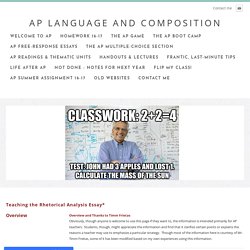
This is pretty common, but what you will see below in my chart is that I also have students identify and create what I have titled the “Command” and the “Conquer.” I use this language because it allows my students to picture they are going to war with their rhetorical analysis essay; and once they receive their command, they can devise a way to conquer the territory: the excerpt for analysis. Of all of the things I do with my students, the most important step of this whole process—before they use my templates—is having them create the “Conquer Question” BEFORE reading the excerpt they need to analyze. If you check out what’s below, you’ll see how this question is generated:Prompt: The passage below is from the opening of an essay, “On Seeing England for the First Time,” by Jamaica Kincaid.
AP Summer Institute: English Language and Composition. AP Institute-English Language and Composition Instructor: John Corrigan SYLLABUS: Language and Composition, Montgomery College AP Language and Composition: Multi-Day Workshop Itinerary.
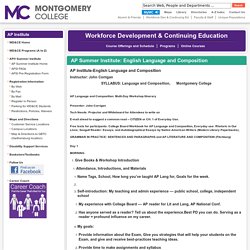
Documents for AP English 11 - Mr. Dryke. Domokos's English Classes - AP Lang and Comp Assignments, Notes, & Handouts. Writing Workshop Handouts - AP English Language and Composition - Ms. Alexander. Helpful Handouts - Ferris: AP Lang. AP Language & Composition. How And Why To Keep A “Commonplace Book” The other day I was reading a book and I came across a little anecdote.
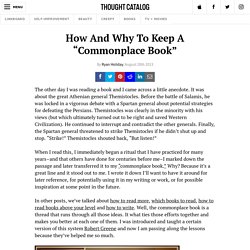
It was about the great Athenian general Themistocles. Before the battle of Salamis, he was locked in a vigorous debate with a Spartan general about potential strategies for defeating the Persians. Themistocles was clearly in the minority with his views (but which ultimately turned out to be right and saved Western Civilization). He continued to interrupt and contradict the other generals. Finally, the Spartan general threatened to strike Themistocles if he didn’t shut up and stop. How I Helped My Students Assess Their Own Writing - How I Helped My Students Assess Their Own Writing contributed by Peg Grafwallner, M.Ed.
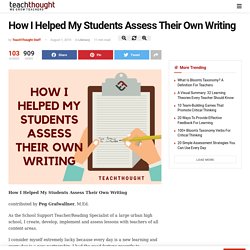
As the School Support Teacher/Reading Specialist of a large urban high school, I create, develop, implement and assess lessons with teachers of all content areas. Bridging the Writing Gap: Centering Student Voices in High School and College Writing. By Kristen Marakoff and P.L. Thomas Kristen Marakoff’s journey to becoming a high school English teacher began 7 years ago in Paul Thomas’ foundations course. She completed the certification program at Paul’s university, where he taught English Language Arts teaching methods and supervised her field work. Paul also teaches first-year writing—after teaching high school English throughout the 1980s and 1990s.
During Kristen’s first years of teaching, they have continued a conversation about the gap between what students learn about writing in high school and then what students confront once they enter college. Commonplace book. A commonplace book from the mid-17th century Commonplace books (or commonplaces) were a way to compile knowledge, usually by writing information into books.
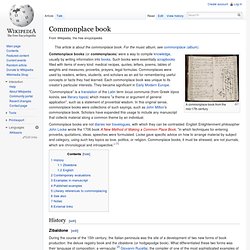
Such books were essentially scrapbooks filled with items of every kind: medical recipes, quotes, letters, poems, tables of weights and measures, proverbs, prayers, legal formulas. Commonplaces were used by readers, writers, students, and scholars as an aid for remembering useful concepts or facts they had learned. Each commonplace book was unique to its creator's particular interests. They became significant in Early Modern Europe. Welcome - Research Basics: an open academic research skills course - LibGuides at JSTOR. Statista - The Statistics Portal for Market Data, Market Research and Market Studies. Aristotle’s Ethics. 1. Preliminaries Aristotle wrote two ethical treatises: the Nicomachean Ethics and the Eudemian Ethics. He does not himself use either of these titles, although in the Politics (1295a36) he refers back to one of them—probably the Eudemian Ethics—as “ta êthika”—his writings about character. The words “Eudemian” and “Nicomachean” were added later, perhaps because the former was edited by his friend, Eudemus, and the latter by his son, Nicomachus.
In any case, these two works cover more or less the same ground: they begin with a discussion of eudaimonia (“happiness”, “flourishing”), and turn to an examination of the nature of aretê (“virtue”, “excellence”) and the character traits that human beings need in order to live life at its best. Though the general point of view expressed in each work is the same, there are many subtle differences in organization and content as well. AP® English Language and Composition. VISUAL RHETORIC & ANALYSIS. Balanced news via media bias ratings for an unbiased news perspective. 155 Words To Describe An Author's Tone. Writers Write is your one-stop resource for writers. We have put together this list to help you describe an author’s tone. What is tone? Tone refers to an author’s use of words and writing style to convey his or her attitude towards a topic.
What the author feels about the subject is often defined as the tone. What the reader feels is known as the mood. Tip: Don’t confuse tone with voice. Tone = Attitude.Voice = Personality. Tone (attitude) and voice (personality) create a writing style. You may not be able to alter your personality but you can adjust your attitude. The mechanics of tone. Essential Tools for Teaching Rhetoric: The Appeals – The Rhetor's Toolbox.
What are the essential tools for teaching rhetoric and rhetorical analysis? This blog series will explore one tool each week. Aristotle’s Appeals Perhaps the best-known part of Aristotelian rhetoric is the appeal. Aristotle presents three appeals, also known as the Aristotelian triad: ethos, pathos, and logos. All three appeals can be found in most arguments. Rhetorical analysis. Mr. G's New Internet Inventory - AP Lang and Comp. The Writer's notebook is the place where the writer goes to work. Start with a prompt, an idea, a spark. We often write in class. Following the first pass of the draft, revise and polish as best you can for the submitted and graded writer's notebook. Students are required to complete 6 every quarter.
Note: SOME major project drafts count toward your 6 total, if you choose. BBC Two - Back in Time for Dinner. Joseph Gordon-Levitt: How craving attention makes you less creative. Rhetoric Stuff - Google Slides. YouTube. Budweiser Lost Dog Super Bowl Commercial. How to use rhetoric to get what you want - Camille A. Langston. Writing 1.1 Lesson 2 Ethos Pathos Logos. The Cognitive Bias Codex: A Visual Of 180+ Cognitive Biases -
Q & A: How does workshop work to prepare students for college? (Or I love teaching these books) #3TTWorkshop. 10 Short Stories to Make You Think About Life – Taylor Dolpin. Reading a short story is a perfect solution for when we desperately want to read something but we just don’t have enough time to read a whole novel, or when we just don’t want to read a 400 pages long novel in order to be moved or entertained, when we want something short but just as effective. Neil Gaiman said: “A short story is the ultimate close-up magic trick — a couple of thousand words to take you around the universe or break your heart.” Origin, history and meaning of English words.
This is a map of the wheel-ruts of modern English. Revising for Meaning. My colleagues laid our papers down on the table in front of us. Dropped Hyphens, Split Infinitives, and Other Thrilling Developments from the 2019 American Copy Editors Society Conference.
Are You Doing Quick Writes in Your Classroom? Why You Should Be (Especially in an AP Language and Composition Class) Grief is a house. Here are 24 cognitive biases that are warping your perception of reality. Great stories come and go, but there are a certain few that can truly stand the test of time. Tugging on the heartstrings with nostalgic stories can be a powerful tool. Yet, even the most world-renowned storytellers like Disney face pressure to constantly innovate. What Is Swarm Problem Solving? - What Is Swarm Problem Solving? Contributed by Dr. Copy of Rhetorical Remix (Hyperdoc) Tout Google avec un seul compte. A Gentle Corrective for the Epidemic of Identity Politics Turning Us on Each Other and on Ourselves. Commandments of Teaching AP Language and Composition-Part Two – The Rhetor's Toolbox. Atlas of clinical medicine, surgery, and pathology.
AP Language and Composition - Welcome to AP. America Is Addicted to Outrage. Is There a Cure? Teaching Strategies: Benefits of Student Video Creation. SINCERELY, CWIK - Journal. A.P. Lang - WHETSTONE'S WEEBLY. T. Jones' AP English Language & Composition Writing Guide. Multimodal Literacy Resources - WriteSpace. Unit 3 - Analyzing Argument - AP Language and Composition - Mr. Bauer. WhatHOWwhy - DW's Class site. James Fallows on the Reinvention of America.
Why online politics gets so extreme so fast. AP Language and Composition Instructional Video Database. QOEGV. Writingrhetoricalanalysis new. Louis, Can of Cola. The Best Theory Of Knowledge Resources In 2016 – So Far. Weekly Prose Collaboration Group. The Daring English Teacher: 5 Ways to Analyze Nonfiction. The San Diego Union-Tribune.
Example Video Review (AP Synthesis Essay) What Makes a Good Life: Revelatory Learnings from Harvard’s 75-Year Study of Human Happiness. Literary Nonfiction Definition and Examples. Using the Comics of Savage Chickens to Teach Satire in High School English — The Bespoke ELA Classroom. Rhetological Fallacies – A list of Logical Fallacies & Rhetorical Devices with examples. Meet Google Drive – One place for all your files. Teaching Nonfiction in an Organized Way. You Should Never, Ever Argue With Anyone on Facebook, According to Science. WENKE - Too Much Pressure.pdf. Calling Bullshit. All the cool new friends you'll meet when you drink raw water.
Chart shows how opioid deaths soared between 1999 and 2015. Engaging With Contrary Evidence. Making Arguments Stronger: How to Get Students to Consider All Sides of an Issue. Commonplace Books Then and Now. Rhetoric: Informational Texts - Virtual English 303. Counterclaim +Rebuttal Paragraph. Counterclaim +Rebuttal Paragraph. Collaborative Rhetorical Analysis Poster Project.